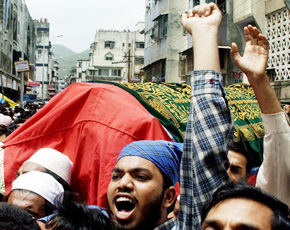
A charge-sheet has finally been filed in the June 2004 encounter killing of Ishrat Jahan, a 19-year-old girl from Mumbai, and three others, Pranesh Pillai (alias Javed Ghulam Sheikh), Amjad Ali Rana and Zeeshan Johar at the hands of the Gujarat police.
It’s been a long time coming, especially since the State Government of Gujarat headed by Chief Minister Narendra Modi has actively tried to obstruct the High Court-monitored investigation being conducted by the Central Bureau of Investigation.
Right till the last moment, fanciful stories were sought to be circulated since the accused consist of top Gujarat police officials, including a serving Additional Director-General of Police, P.P. Pandey, who continues to elude the law, to torpedo the investigation.
A first charge-sheet was filed on July 3 against seven police officers, including Pandey, once considered to be a blue-eyed boy of Chief Minister Modi, who’s now been chosen to lead the opposition Bharatiya Janata Party in India’s national elections scheduled for 2014.
The charge-sheet makes it clear that the encounter was “fake” and the bizarre stories floated by the Gujarat police claiming that Ishrat Jahan was a terrorist, cut no ice with the investigators.
And, the encounter of Ishrat Jahan and three others is by no means an isolated instance. There are at least three other encounter killings between 2004 and 2007 in which senior Gujarat police officers are said to be involved.
The charge-sheet in the Ishrat Jahan case shows clearly that an Intelligence Bureau (IB) official Rajinder Kumar has a lot to answer for. Media reports suggest that a turf war has broken out between the CBI and IB over prosecuting Kumar in the encounter killing.
The document shows that Kumar was present at a meeting between Pandey, Deputy Inspector General of Police and accused D.G. Vanazara and absconder Pandey on June 13, 2004, when the “further plan” to eliminate the four was allegedly hatched.
It also contains a claim by a police officer that the Ishrat Jahan encounter was allegedly approved by Chief Minister Modi, who was also Home Minister of the State.
CBI chief Ranjit Sinha has spoken out clearly on what he thinks about the “turf war” with the Intelligence Bureau. He told the Indian Express newspaper: “We have no political agenda ... a bogey is being created that thanks to the Ishrat Jahan case the entire IB will stop functioning and national security will be in jeopardy.”
Even as there’s talk about a second charge-sheet being filed in the case, it’s clear that the Congress-led government in Delhi is silently watching the stories being planted by sections of the IB and the response from the CBI.
The criminal behaviour of the Gujarat policemen has been made crystal clear by the charge-sheet, but the fate of IB official Rajinder Kumar still remains unclear. It’s possible that he may be named in a second charge-sheet or the courts might make him an accused.
Whatever be the fate of the accused during the trial process, the fact is that criminality of this kind cannot be tolerated in a State police force or in senior intelligence officials in the country.
There’s little doubt that this “national security mindset” cuts across party political lines and has support from a section of the middle class that believes bumping off people is legitimate State policy.
Such an argument goes against all cannons of law and violates the Indian Constitution.
It is criminal behaviour by law enforcement authorities that turns innocent into terrorists.
The Ishrat Jahan case, rare as it is in having had a thorough investigation, must lead to a speedy conclusion.
Justice in this case must come as a deterrent for those cops and intelligence officials plotting and planning other fake encounter killings.
There must be zero tolerance for criminal behaviour among law enforcement officials and their political masters who condone or encourage such behaviour.











































